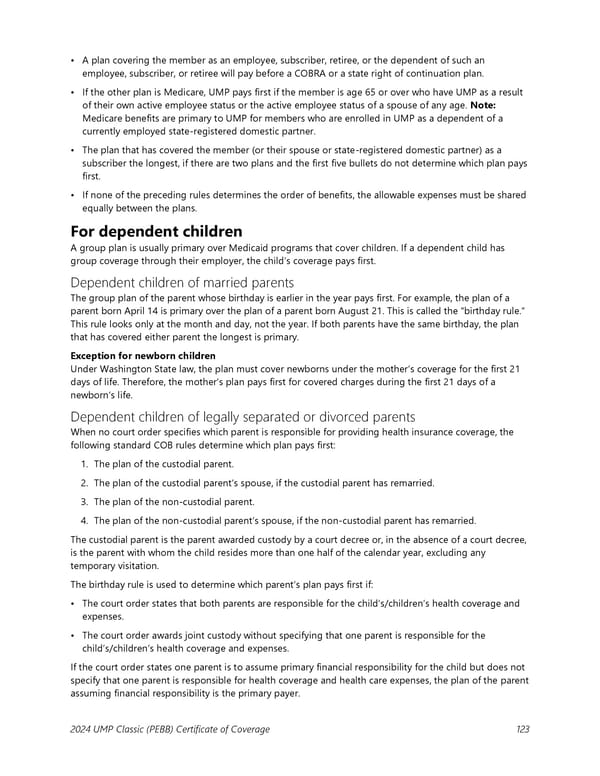• A plan covering the member as an employee, subscriber, retiree, or the dependent of such an employee, subscriber, or retiree will pay before a COBRA or a state right of continuation plan. • If the other plan is Medicare, UMP pays first if the member is age 65 or over who have UMP as a result of their own active employee status or the active employee status of a spouse of any age. Note: Medicare benefits are primary to UMP for members who are enrolled in UMP as a dependent of a currently employed state-registered domestic partner. • The plan that has covered the member (or their spouse or state-registered domestic partner) as a subscriber the longest, if there are two plans and the first five bullets do not determine which plan pays first. • If none of the preceding rules determines the order of benefits, the allowable expenses must be shared equally between the plans. For dependent children A group plan is usually primary over Medicaid programs that cover children. If a dependent child has group coverage through their employer, the child’s coverage pays first. Dependent children of married parents The group plan of the parent whose birthday is earlier in the year pays first. For example, the plan of a parent born April 14 is primary over the plan of a parent born August 21. This is called the “birthday rule.” This rule looks only at the month and day, not the year. If both parents have the same birthday, the plan that has covered either parent the longest is primary. Exception for newborn children Under Washington State law, the plan must cover newborns under the mother’s coverage for the first 21 days of life. Therefore, the mother’s plan pays first for covered charges during the first 21 days of a newborn’s life. Dependent children of legally separated or divorced parents When no court order specifies which parent is responsible for providing health insurance coverage, the following standard COB rules determine which plan pays first: 1. The plan of the custodial parent. 2. The plan of the custodial parent’s spouse, if the custodial parent has remarried. 3. The plan of the non-custodial parent. 4. The plan of the non-custodial parent’s spouse, if the non-custodial parent has remarried. The custodial parent is the parent awarded custody by a court decree or, in the absence of a court decree, is the parent with whom the child resides more than one half of the calendar year, excluding any temporary visitation. The birthday rule is used to determine which parent’s plan pays first if: • The court order states that both parents are responsible for the child’s/children’s health coverage and expenses. • The court order awards joint custody without specifying that one parent is responsible for the child’s/children’s health coverage and expenses. If the court order states one parent is to assume primary financial responsibility for the child but does not specify that one parent is responsible for health coverage and health care expenses, the plan of the parent assuming financial responsibility is the primary payer. 2024 UMP Classic (PEBB) Certificate of Coverage 123
 UMP Classic COC (2024) Page 123 Page 125
UMP Classic COC (2024) Page 123 Page 125